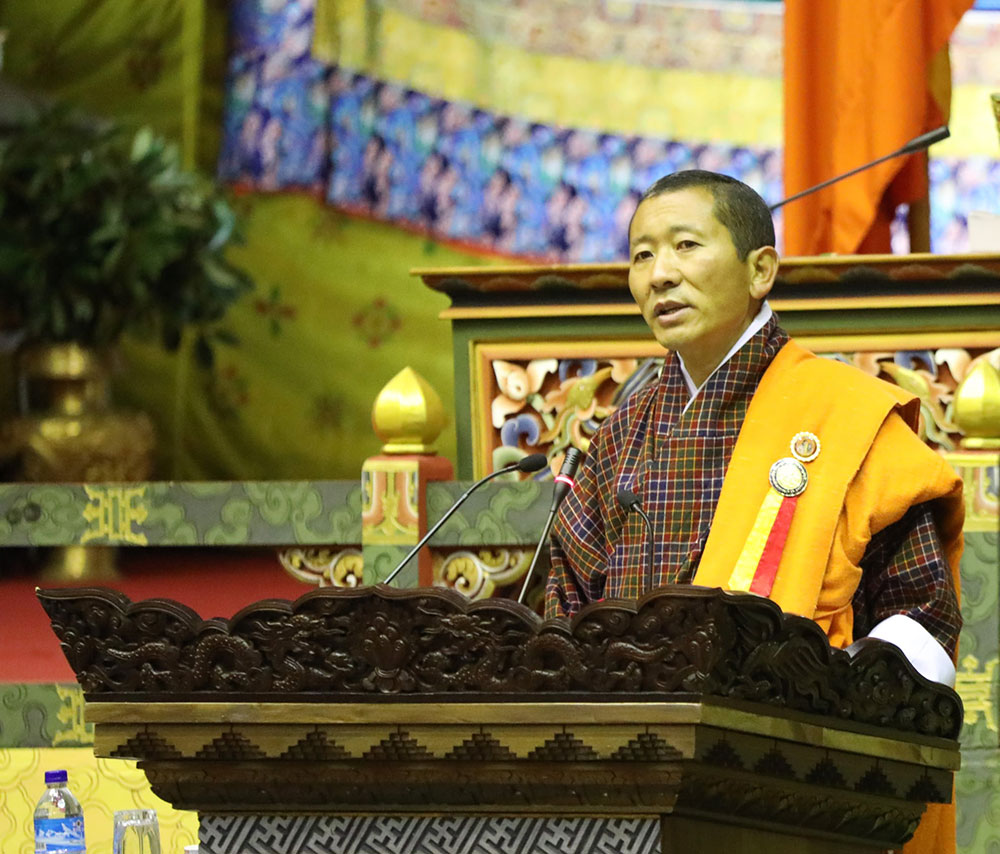… commits to enhancing good governance
Tshering Palden
“The golden yoke of secular laws is upon us now, particularly for the government of the day. The habitual conduct of justifying and defending ourselves in everything we do must stop.”
Prime Minister Dr Lotay Tshering said in his self-styled report of the State of the Nation to the Joint Sitting of Parliament yesterday which made strong reference to His Majesty The King’s 114th National Day Address to the nation.
What was unique about His Majesty’s address this National Day was that the concerns, hopes and aspirations of the common people were re-articulated as the King’s Command.
Lyonchhen said that Bhutanese must shed the tendency to interpret and dissect His Majesty’s messages following the delivery, only to wane soon after. And that Bhutan must change the outlook and approach so that all organisations that make up the public system transform to fulfil the national goals.
“As the head of the government, the ‘golden yoke’ is upon me to deliver the highest level of accountability and be ready for consequences should I be unsuccessful. This, I pledge today.”
He called on each Bhutanese to reflect on the Royal address as if the command were issued to oneself and put in all possible efforts to realise the noble vision for the country.
Lyonchhen said that it was painful to hear the profound enunciation of the word “nGar” (grit, resolve) and the subsequent deterioration of those qualities in the last 15 years of His Majesty’s reign.
He said that in truth, this period co-relates to the unveiling of the democratic process and that of elected governments. Despite numerous reminders and guidance from the Throne over the years, good governance has declined. “We loosely state that Royal Command is binding and indubitable and yet we have been deficient.”
Therefore, Lyonchhen said that it was the responsibility of the government of the day, to redeem the faith and embrace the ability and the willingness to deliver. “In His Majesty’s words, accountability must become the “cornerstone of governance”.
In the process of democratic transition and reflecting on his own experiences, Lyonchhen said that it was true that the elected governments were swayed by political gains by warming up to people for votes and fulfilling pledges. And that in trying to sustain the goodwill, laxity has set in.
“There are times when we are unable to speak our mind and are unable to do what we want to do given the chains of deeply entrenched rules and systems,” he said.
He said that some people would be disappointed in the process of adopting the new approach.
“We ask for your patience and understanding, but please remember that we can no longer continue on the same redundant path which would not take us far,” he said.
Constitution highlights “Good Governance” under Article 15 clause 1 for Political parties, Article 18 clause 1 for The Opposition Party, Article 20 clause 1 for The Executive, and Article 26 clause 4 for Royal Civil Service Commission.
“Undoubtedly, promoting and strengthening good governance is a combined and concerted effort. Let’s revive the true essence of good governance and work towards His Majesty’s expectations in service of the people of Bhutan.”
With the command from the His Majesty The King that has transpired from the submission of the citizens, the ultimate task at hand is to revolutionise the Bhutanese way of working for the greater good of the people and the country.
“If those entrusted with the tasks don’t know they need to be taught. Those who serve need to listen and provide unconditional support,” he said.
“Together, we must uphold accountability and institute exceptional work ethics. We need to correct the glaring weaknesses and shortcomings infesting our system.”


